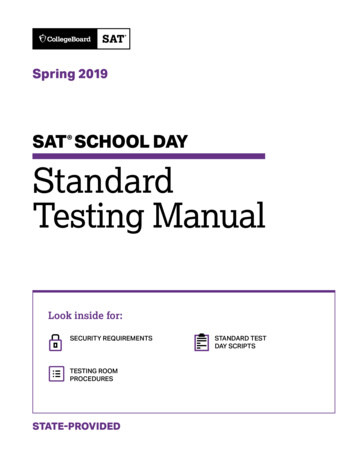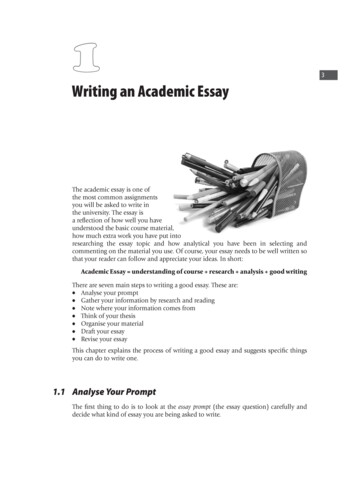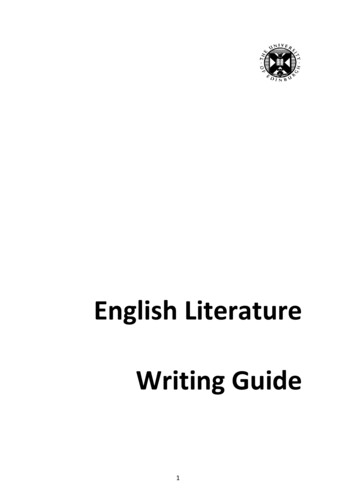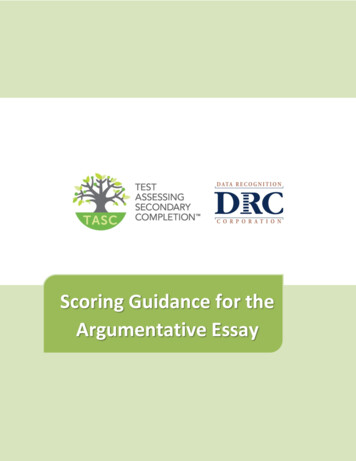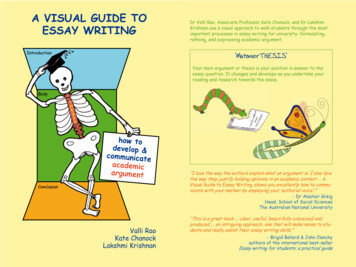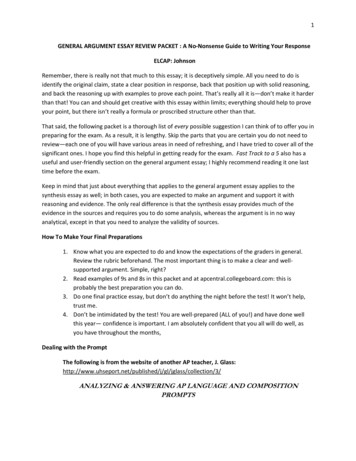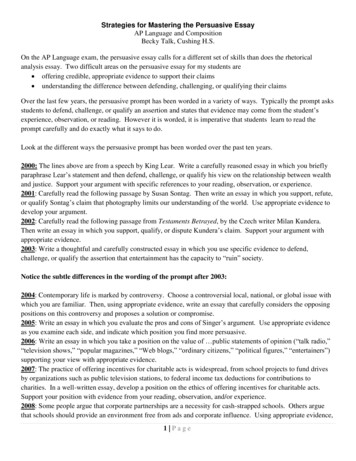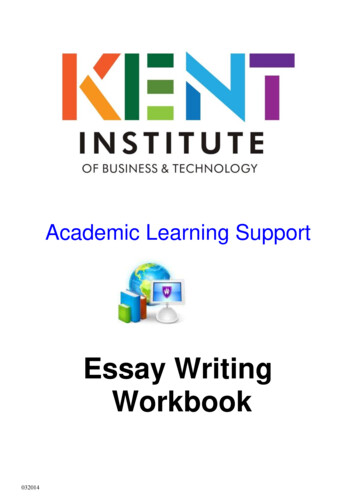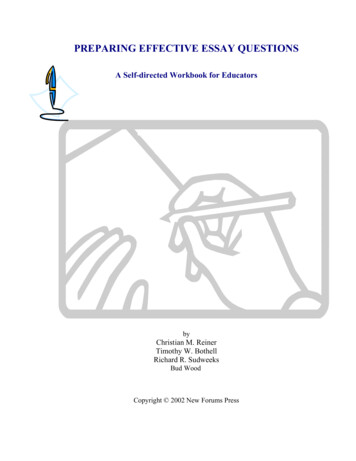
Transcription
PREPARING EFFECTIVE ESSAY QUESTIONSA Self-directed Workbook for EducatorsbyChristian M. ReinerTimothy W. BothellRichard R. SudweeksBud WoodCopyright 2002 New Forums Press
PrefaceAlthough essay questions are one of the most commonly used methods for assessingstudent learning, many are poorly designed and ineffectively used. Writing effectiveessay questions requires training and practice. There are subtle characteristics of effectiveessay questions that are often difficult to discern for those without adequate training. Thisworkbook was developed to provide training and practice in discerning the often difficultto see characteristics of effective essay questions and to support educators in thedevelopment and use of essay questions.This workbook supports educators from all schools and disciplines. In addition, itsupports teaching assistants who work with educators and often have exam developmentand grading responsibilities.This workbook is the first in a series of three workbooks designed to improve thedevelopment and use of effective essay questions. It focuses on the writing and use ofessay questions. The second booklet in the series focuses on scoring student responses toessay questions. The third workbook focuses on preparing students to respond to essayquestions and can be used with both educators and students.To support educators, this workbook is divided into sections answering the followingthree questions:1. What is an essay question?2. When should essay questions be used?3. How should essay questions be constructed?The format of this workbook is suitable for use with seminars or workshops and can befacilitated by an instructor. However, it is primarily designed to be studied alone as a selfdirected learning tool. Each section contains assessments, practice exercises and reviewactivities that will foster understanding and improve writing and use of effective essayquestions. Each exercise includes feedback for users to check their progress andunderstanding. To maximize learning with this workbook, the authors recommend thatusers follow the order of material sequentially.
TABLE OF CONTENTSIntroduction . . . . . . . . . . . . . . . . . . . . . . . . . . . . . . . . . . . . . . . . . . . . . . . . . 4Booklet Objectives . . . . . . . . . . . . . . . . . . . . . . . . . . . . . . . . . . . . . . . 5Section 1: What is an Essay Question? . . . . . . . . . . . . . . . . . . . . . . . . . . . 6Definition . . . . . . . . . . . . . . . . . . . . . . . . . . . . . . . . . . . . . . . . . . 6Advantages . . . . . . . . . . . . . . . . . . . . . . . . . . . . . . . . . . . . . . . . 10Limitations . . . . . . . . . . . . . . . . . . . . . . . . . . . . . . . . . . . . . . . 11Common Misconceptions. . . . . . . . . . . . . . . . . . . . . . . . . . . . . 12Section 2: When Should Essay Questions be Used?. . . . . . . . . . . . . . . . . 15Section 3: How Should Essay Questions be Constructed?. . . . . . . . . . . . 22Checklist for Reviewing Essay Questions. . . . . . . . . . . . . . . . . . . . . . . . . 39Bibliography . . . . . . . . . . . . . . . . . . . . . . . . . . . . . . . . . . . . . . . . . . . . . . . . . 40Appendix A – Answers to Review Exercises . . . . . . . . . . . . . . . . . . . . . . . . 42Appendix B – Directive Verb Definitions and Examples . . . . . . . . . . . . . . .47Appendix C – Bloom’s Cognitive Process Dimensions . . . . . . . . . . . . . . . . 50
IntroductionWhen was the last time you used an essay question to assess student performance?Why did you choose an essay item over other forms of assessment? How comfortable didyou feel with developing the essay item and scoring student responses? The answers tothese questions vary from educator to educator.Educators choose essay questions over other forms of assessment because essayitems challenge students to create a response rather than to simply select a response. Someeducators use them because essays have the potential to reveal students' abilities to reason,create, analyze, synthesize, and evaluate. In short, essay items are used for the advantagesthey offer.Despite the advantages associated with essay questions, there are alsodisadvantages. Have you ever labored over the wording of an essay question in an effort tomake it clear and precise so that the students know exactly what you expect of them? Orhave you ever felt the frustration of trying to develop reliable and fair scoring criteria forgrading students' responses to essay questions only to discover that you were as unsure ofwhat was asked for in the essay question as the students? These are some of the difficultiesof essay questions. This workbook addresses the advantages and disadvantages of essayquestions and illustrates ways of improving the use of essay questions.There are two major purposes for using essay questions. One purpose is to assessstudents' understanding of and ability to think with subject matter content. The otherpurpose is to assess students' writing abilities. These two purposes are so different in naturethat it is best to treat them separately. This workbook will focus on essay questions thatassess students' thinking skills. When going through this workbook it is important to keepthis focus in mind and to understand that some of the rules and principles discussed mayeven contradict rules and principles that apply for essay questions that assess students'writing skills.4
Workbook ObjectivesSpecifically, the workbook is designed to support educators in:1. Understanding the main advantages and limitations of essay questions and commonmisconceptions associated with their use.2. Distinguishing between learning outcomes that are appropriately assessed by usingessay questions and outcomes that are likely to be better assessed by other means.3. Evaluating existing essay questions using criteria of effective essay questions.4. Improving poorly written essay questions by using the criteria for effective essayquestions to identify flaws in existing questions and correct them.5. Constructing well-written essay questions that assess given objectives.5
WHAT IS AN ESSAY QUESTION?Section 1:What is an Essay Question?There are few definitions for what constitutes an essay question. Of those definitionsthat can be found, a definition given a long time ago by John M. Stalnaker (1951, p.495)appears to be the most helpful."A test item which requires a response composed by the examinee, usually in the form ofone or more sentences, of a nature that no single response or pattern of responses can belisted as correct, and the accuracy and quality of which can be judged subjectively onlyby one skilled or informed in the subject."Based on Stalnaker's definition, an essay question should meet the following criteria:1. Requires examinees to compose rather than select their response.2. Elicits student responses that must consist of more than one sentence.3. Allows different or original responses or pattern of responses.4. Requires subjective judgment by a competent specialistto judge the accuracy and quality of responses.Multiple-choice questions, matching exercises, and true-false items are allexamples of selected response test items because they require students to choose an answerfrom a list of possibilities, whereas essay questions require students to compose their ownanswer. However, requiring students to compose a response is not the only characteristic ofan effective essay question. There are assessment items other than essay questions thatrequire students to construct responses (e.g., short answer, fill in the blank). Essayquestions are different from these other constructed response items because they requiremore systematic and in-depth thinking. An effective essay question will align with each ofthe four criteria given in Stalnaker’s definition and provide students with an indication ofthe types of thinking and content to use in responding to the essay question.6
WHAT IS AN ESSAY QUESTION?To review the criteria for an effective essay question, evaluate Example A.Determine if it meets the criteria for an effective essay question. Then check to see if yourevaluation is consistent with the explanation provided.Example AList the 7-step path to making “ethical decisions.” List them in their correctprogressive order.ExplanationExample A does not meet the criteria for effective essay questions for the followingreasons:1. The question does not require students to use complete sentences or more than onesentence. Students may respond to Example A by simply listing the name andnumber for each step.2. Depending on where students learned the steps, all the responses they give to theessay question may be identical. Students will basically repeat the 7-step pathword for word. The question does not allow for original responses or responsepatterns.3. Although the question does require a list of steps, it does not require systematicand complex thinking about the ideas. While some essay questions may serve theirpurpose in requiring students to list certain ideas, the most effective essayquestions require deep and original thinking. Effective essay questions elicit adepth of thought from students that can only be judged by someone with theappropriate experience and expertise in the content matter. Thus, content expertiseis essential for both writing and grading essay questions.To gain a better understanding of the basic elements of an essay look at Example B.Again, determine whether the given example contains the basic elements of an essayquestion and then compare your answer with the explanation below the example.7
WHAT IS AN ESSAY QUESTION?Example BExplain in what ways a person’s failure to apply step 5 of the seven-step path formaking ethical decisions will impact his or her ability to make ethical decisions.Provide an example that illustrates this impact.ExplanationExample B is an effective essay question. Not only do students need to compose aresponse, but they also need to write several sentences in order to provide an answer thatsufficiently meets the demands of the given task. Moreover, the task given to students inthe essay question is constructed in such a way that it allows for different responses andresponse patterns. Students can provide a wide variety of examples to illustrate the impact ,and they can structure their response in various ways. They could give the example firstand then provide an explanation, or they could state the impact first and then provide anexample. Students could also go back and forth between their explanation and theirexample as they write their response. They could look at the interaction between step 5 andother steps of the seven-step path in various ways. For example, one student might focuson the interaction between step 5 and step 4 and another student might focus on theinteraction between step 5 and step 6. Hence, the task allows for original responses andresponse patterns. Because of the variety of possible answers, a competent specialist in theseven-step path for making ethical decisions must judge the accuracy and quality of thestudent responses. The grader must have a good understanding of the model to judge theaccuracy, quality, and relevance of students’ explanations and examples. This closer lookat Example B shows that it contains the basic elements of an effective essay question.Review: What is an Essay Question?An essay question is a test item which contains the following elements:1.2.3.4.1.2.3.Requires examinees to compose rather than select their response.Elicits student responses that must consist of more than one sentence.Allows original responses and response patterns.Requires subjective judgment by a competent specialist to judge theaccuracy and quality of student responses.5. Provides students with an indication of the types of thinking and content touse in responding to the essay question.8
WHAT IS AN ESSAY QUESTION?Review Exercise: What is an Essay Question?For each of the following essay questions, decide whether it matches the definition givenfor effective essay questions. Mark “Yes” if the essay question matches the definition and“No” if it does not match the definition. If the question does not match the definition foran effective essay question, reconstruct the question in such a way that it matches andwrite your answer in the space below the original question. Check your answers with theanswers in the Appendix A (p. 42).YesNoEssay question1. Restate the definition for ‘opportunity cost’ that was provided in class.Improvedessay question:2. Should Olympic games ever be cancelled because of the threats ofterrorist attacks?Improvedessay question:3. What are the 3 basic steps of photosynthesis?Improvedessay question:4. Compare and contrast descriptive research and empirical research?Improvedessay question:9
WHAT IS AN ESSAY? - ADVANTAGES, LIMITATIONS & COMMON MISCONCEPTIONSAdvantages, Limitations, and Common Misconceptions of Essay QuestionsIn order to use essay questions effectively, it is important to understand thefollowing advantages, limitations and common misconceptions of essay questions. Withoutunderstanding them, educators may use an essay question when another item type wouldbe more appropriate, or educators may grossly underestimate what would be required toeffectively use essay questions.Advantages1. Assess higher-order or critical thinking skills.Essay questions provide an effective way of assessing complex learning outcomesthat cannot be effectively assessed by other commonly used paper-and-pencil assessmentprocedures. In fact, some of the most complicated thinking processes can only be assessedthrough essay questions, when a paper-and-pencil test is necessary (e.g., assessingstudents’ ability to make judgments that are well thought through and that are justifiable).2. Evaluate student thinking and reasoning.Essay questions require students to demonstrate their reasoning and thinking skills,which gives teachers the opportunity to detect problems students may have with theirreasoning processes. When educators detect problems in students’ thinking, they can helpthem overcome those problems.3. Provide authentic experience.Constructed responses are closer to real life than selected responses. Problemsolving and decision-making are vital life competencies. In most cases these skills requirethe ability to construct a solution or decision rather than select a solution or decision froma limited set of possibilities.10
WHAT IS AN ESSAY? - ADVANTAGES, LIMITATIONS & COMMON MISCONCEPTIONSLimitations1. Assess a limited sample of the range of content.Due to the time it takes for students to respond to essay questions and for graders toscore responses, the number of essay questions that can be included in a test is limited.Thus, essay questions necessitate testing a limited sample of the subject matter, therebyreducing content validity. A test of 80 multiple-choice questions will most likely cover awider range of content than a test of 3-4 essay questions.2. Are difficult and time consuming to grade.Answers to essay questions are likely to be graded less reliably than other types oftest questions and take considerable time to grade. One of the advantages of essayquestions is that they allow students some latitude in formulating their responses.However, this advantage comes at the cost of time spent scoring and reliability in scoring.Different readers may vary in their grading of the same or similar responses(interscorer reliability) and one reader can vary significantly in his grading consistencydepending on many factors (intrascorer reliability). Therefore, essay answers of similarquality may receive notably different scores. Gender and ethnic bias, the length andlegibility of the response, and the personal preferences of the grader with regards to thecontent and structure of the response are some of the factors that can lead to unreliablegrading.3. Provide practice in poor or unpolished writing.The way in which students construct their responses to essay questions differs inseveral ways from real-world writing tasks. Ebel and Frisbie (1986) point out that "thepractice that essay tests give in writing may be practice in bad writing—hasty, illconsidered, and unpolished" (p. 128).11
WHAT IS AN ESSAY? - ADVANTAGES, LIMITATIONS & COMMON MISCONCEPTIONSMisconceptions1. Assess higher-order or critical thinking skills regardless of how the responses arewritten.An essay question does not automatically assess higher-order thinking skills. Essayquestions often simply assess recall. Also, if a teacher designs an essay question meant toassess higher-order thinking but then scores students’ responses in a way that only rewardsrecall ability, that teacher is not assessing higher-order thinking.Compare the following two examples and decide which one assesses higher-orderor critical thinking skills.Example AWhat are the major advantages and limitations of essay questions?Example BGiven their advantages and limitations, should an essay question be used to assessstudents’ abilities to create a solution to a problem? In answering this question providebrief explanations of the major advantages and limitations of essay questions. Clearlystate whether or not you think an essay question should be used and explain the reasoningfor your judgment.Example A assesses recall of factual knowledge, whereas Example B requires moreof students. It not only requires students to recall facts, but also to make an evaluativejudgment, and to explain the reasoning for the judgment. Example B requires morecomplicated thinking than Example A.2. Essay questions are easy to construct.Essay questions are easier to construct than multiple-choice items because there is noneed to create effective distracters. However, that doesn’t mean that good essay questionsare easy to construct. They may be easier to construct in a relative sense, but constructing12
WHAT IS AN ESSAY? - ADVANTAGES, LIMITATIONS & COMMON MISCONCEPTIONSthem still requires a lot of effort and time. Essay questions that are hastily constructedwithout much thought and review usually function poorly.3. The use of essay questions eliminates the problem of guessing.The use of essay questions introduces bluffing, another form of guessing. Somestudents are adept at using various methods of bluffing (vague generalities, padding, namedropping, etc.) to add credibility to an otherwise vacuous answer. Thus, the useof essay questions changes the nature of the guessing that occurs, but does noteliminate it.4. Essay questions benefit all students by placing emphasis on the importance ofwritten communication skills.Written communication is a life competency that is required for effectiveperformance in many vocations. Essay questions challenge students to organize andexpress ideas and solutions in their own words, thereby giving them a chance to practicewritten communication skills that will be helpful to them in future vocationalresponsibilities. At the same time, the focus on written communication skills is a seriousdisadvantage for students who have marginal writing skills but know the subject-matterbeing assessed. To the degree that students who are knowledgeable in the subject obtainlow scores because of their inability to write well, the validity of the test scores will bediminished.5. Essay questions encourage students to prepare more thoroughly.Some research seems to indicate that students are more thorough in theirpreparation for essay questions than in their preparation for objective examinationscontaining multiple-choice or matching questions. However, after an extensive review ofexisting literature and research on this topic, Crook concluded that "student expectations ofthe cognitive level and content of tasks probably exert much more influence on their studybehavior and achievement than do their expectations of the task format (for given contentand cognitive level)" (1988, p. 448). Thus, Crook concludes that students prepare more13
WHAT IS AN ESSAY? - ADVANTAGES, LIMITATIONS & COMMON MISCONCEPTIONSbased on the expectations teachers set upon them (more complicated thinking, criticalthinking and breadth and depth of content) than they do by the type of test question theyexpect to be given.Review: Advantages, Limitations, and Misconceptionsof Essay QuestionsAdvantagesEssay Questions:1. Assess higher-order or critical thinking skills.2. Evaluate student thinking and reasoning.3. Provide authentic experience.LimitationsEssay Questions:1. Assess a limited sample of the range of content.2. Are difficult and time consuming to grade.3. Provide practice in poor or unpolished writing.4. Provide practice in poor or unpolished writing.Misconceptions1.2.3.4.Assess higher-order or critical thinking skills regardless of how they are written.Essay questions are easy to construct.The use of essay questions eliminates the problem of guessing.Essay questions benefit all students by placing emphasis on the importance ofwritten communication skills.5. Essay questions encourage students to prepare more thoroughly.14
WHEN SHOULD ESSAY QUESTIONS BE USED?Section 2:When Should Essay Questions Be Used?In order for assessment of student learning to accurately represent the degree towhich a student has achieved an intended learning outcome, it is essential that the kind oftest question used be suitable for testing the intended learning outcome. Essay questionsare generally most suitable for the following purposes: To assess students’ understanding of subject-matter contentTo assess students’ abilities to reason with their knowledge of a subjectTo determine what type of test item to use, the first step is to consider the intendedlearning outcome or objective that the test item is meant to assess. Learning objectivesalmost always contain verbs that can provide direction for the choice of assessmentmethod. The verbs that best describe the ability or abilities the instructor intends to assessare sometimes referred to as “directive verbs” (Moss & Holder, 1988, p.17). The term“directive verbs” refers to verbs that are thoughtfully and carefully selected to indicatewhat thought processes and actions students must exhibit to provide evidence that learninghas occurred (see Appendix B for a sample list). The “directive verb” used in the statementof the intended learning outcome can, in some cases, also be used in the test question. Inthis case, the directive verb provides students with clear directions for their responses.Regardless of whether the verb in the intended learning outcome is the same as the one inthe test question, verbs in essay questions should serve to channel and focus the studentresponses towards the performance to be assessed.Some directive verbs clearly indicate that students need to construct rather thanselect their answer (e.g., “explain”). Other directive verbs indicate that the intendedlearning outcome requires students to select the answer (e.g., “identify”). The skill to recallor remember information is generally best assessed through objectively scored items suchas multiple-choice items. Directive verbs that are meant to elicit students’ understanding ofsubject matter, content, or other forms of higher-order or critical thinking but do notspecify whether the student is to construct or to select the response (e.g., “interpret”) canbe assessed either by essay questions or by objective items. There are no perfect criteria fordetermining which type of test question should be used, but there are some considerations15
WHEN SHOULD ESSAY QUESTIONS BE USED?that should be given to the directive verbs within learning objectives and within intendedlearning outcomes. Answering a few questions about the verbs used in the intendedlearning outcome to be assessed can guide educators in selecting test items.Educators can mentally proceed through several questions about the intendedlearning outcome to determine if the use of essay questions is appropriate to assess theintended learning outcome. In essence, the answers to the questions about the intendedlearning outcome become the criteria that will point to essay questions or away from essayquestions. And, the directive verb is the place to focus when answering the followingquestions meant to illustrate the mental process an educator can go through.Criteria to Determine if Essay Questions Should be Used1. Can students demonstrate the action and thinking processes indicated by thedirective verb in the intended learning outcome by selecting answers from optionsand/or by constructing answers?Selecting or constructingEssay or Multiple-ChoiceSelecting onlyMultiple-ChoiceConstructing onlyEssay2. If students can demonstrate the action and thinking processes related to thedirective verb in the intended learning outcome in either an essay question or anobjective item such as a multiple-choice question, then consider the following: Your skill in writing objective questions Your resources and time available for gradingLow skill in writing objective questions andample resources and time for gradingEssay QuestionsHigh skill in writing objective questions andlimited resources and time for gradingMultiple-choice3. How critical are original and authentic student responses? If it is important tomake students’ thinking explicit, then original work is required.Original and authenticNot necessary that responses be originalEssay QuestionsMultiple-choice16
WHEN SHOULD ESSAY QUESTIONS BE USED?Based on these guidelines, decide for the following list of directive verbs whetherthe skill described is best assessed by essay questions, by objective items, or if it could beassessed by either objective or essay items. In the exercise below, write each directive verbin its corresponding circle of Diagram 1 and compare your answers with the answer key onthe page following this exercise. If necessary, use the definitions for the given directiveverbs that are found in Appendix B.DIRECTIVE VERBS ferrecalldefendinterpretrecognizeDIAGRAM 1Objective itemsObjective OrEssayEssay Questions17
WHEN SHOULD ESSAY QUESTIONS BE USED?Answer Key:Objective ay yproposeConcerning the ranking of students based on test scores, educators should knowthat some research suggests students are ranked about the same order relative to each otheron essay questions and multiple-choice questions when tests results are compared (Chase& Jacobs, 1992). Thus, the decision to use one item type over another for intended learningoutcomes that can be assessed by either objective or essay can be based on teacherpreference. The choice will probably produce little change in student rankings once gradesare assigned.Table 1 contains several samples of intended learning outcomes and theappropriate test items to use for assessing them. The directive verb in each intendedlearning outcome can be analyzed to provide clues about the method of assessment thatshould be used. For example, the verb “recall” means to retrieve relevant knowledge fromlong-term memory. Students’ ability to recall relevant knowledge can be mosteconomically and reliably assessed through objectively scored test items. There is no needfor students to explain or justify their answers when they are assessed on recall.The verb “analyze” means to determine how parts relate to one another and toan overall structure or purpose. Students can demonstrate their ability to analyze thefunction of humor in Shakespeare’s “Romeo and Juliet” by either describing the function18
WHEN SHOULD ESSAY QUESTIONS BE USED?of humor in their own words or by selecting the right or best answer among differentoptions of a well drafted multiple choice item.The verb “create” means to put elements together to form a coherent or functionalwhole. Creating a solution to a problem requires complex and critical thinking. Hence,students’ ability to create should be assessed with essay items because they allow students’reasoning and coherence of thought to be analyzed by the instructor.Table 1: Sample Intended Learning Outcomes and Item TypeIntended Learning OutcomesStudents will:ObjectiveitemsObjective orEssayEssayQuestions1. Analyze the function of humor in Shakespeare's“Romeo and Juliet”.2. Describe the attributes of a democracy.3. Distinguish between learning outcomesappropriately assessed using essay questions andoutcomes better assessed by some other means.4. Create a solution to economic inequality in theUnited States.5. Know the definition for the Law of Supply andDemand.6. Predict the outcome of an experiment.7. Propose a solution for the disposal of batteries thatis friendly to users and the environment.8. Recall the major functions of the human heart.9. Understand the “Golden Rule”.10. Use a literary theory to analyze a poem.19
WHEN SHOULD ESSAY QUESTIONS BE USED?Review: When Should Essay Questions Be Used?It is appropriate to use essay questions for the following purposes: To assess students’ understanding of subject-matter content.To assess students’ abilities to reason with their knowledge of a subject.Use essay questions for intended learning outcomes that require complex thinking andconstructed responses.If an intended learning outcome could be either assessed through objective items or essayquestions, use essay questions for the following situations: When your skill in writing objective items is poor, but your resources and time forgrading are high (e.g., small classes, grading assistants). When student reasoning needs to be evaluated.Review Exercise: When Should Essay Questions Be Used?For each of the following intended learning outcomes, decide whether teachers shouldassess it with an objectively scored test item, a
This workbook is the first in a series of three workbooks designed to improve the development and use of effective essay questions. It focuses on the writing and use of essay questions. The second booklet in the series focuses on scoring student responses to essay questions. The third workbook
